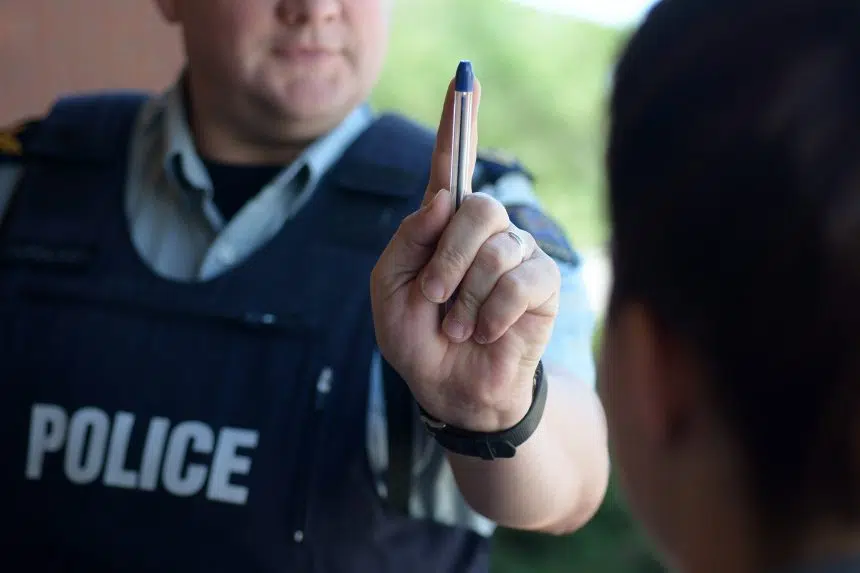When marijuana officially becomes legal this fall, the details about exactly how police will spot and test for people driving high are still hazy.
Breathalyzer tests have been part of police training for a long time when it comes to alcohol, but so far the federal government has not approved a specific instrument to test saliva for the presence of drugs like marijuana. In the meantime, RCMP are training officers to do the same job.
RCMP Corporal Brian Ferguson is in charge of the specialized program to train officers to recognize drivers impaired by any kind of drug. Saskatchewan currently has 74 RCMP officers trained as Drug Recognition Experts, or DREs.
How does testing work?
Ferguson explained the first step for traffic officers is to conduct field sobriety tests focussing on divided attention and dexterity to identify someone suspected of impaired driving.
“If we believe that the person is impaired by a drug then the officers would actually read them a demand saying they believe that you’re are impaired by a drug then they would be arrested for impaired driving,” he said. “You would be brought and submit yourself for testing by a DRE and you would go through our evaluation process.”
The DREs go through a complex 12-step evaluation, testing everything from physical symptoms like pulse, muscle tone, pupils’ reaction to light, eyes bouncing involuntarily and dexterity to cognitive divided attention tests. Based on the results of those 12 tests, the officer can decide to order a toxicology sample of urine or blood to confirm the presence of drugs. Ferguson said the primary choice right now is a urine test.
“If I say ‘yes I believe this person is under the influence of cannabis,’ then I’ll make the demand to that person for them to provide me a sample. That sample will be sent away for testing and so when the testing comes back if that is present in the urine at the time, that confirms my belief that cannabis was the impairing factor,” Ferguson said.
The toxicology results combined with the DRE’s opinion back up a criminal charge of impaired driving in court.
The new bill sets out a toxicology of between two and five nanograms of THC, the active ingredient of cannabis as enough for a criminal charge, but there is a hybrid offence for those who have also been drinking with a blood alcohol content (BAC) of 0.05.
“Alcohol heightens the impairing factors of cannabis, so if you have those two things on board, you’re definitely going to be impaired. And anything of course above the five nanogram levels for THC, that as well too is going to be a per se limit just like we have for alcohol,” Ferguson said.
RCMP: you won’t be tested unless you show signs of impairment
While some may be concerned about the length of time THC can stay in a person’s system and produce a positive test result, Ferguson said the entire point of a DRE is to identify drug impairment.
“If I used it yesterday and it’s not affecting me, but it may still show up on a urine test, we wouldn’t ever get to that point,” he said. “As a DRE I would never ask for that unless I believed that based on everything I had seen up to that point – the fact that you weren’t able to do any of the tests or performed poorly on them to the point where I would believe that you’re actually impaired – then we wouldn’t even be testing your urine, it would be irrelevant.”
In the absence of a DRE, an officer who conducts a field sobriety test and suspects drug impairment can still order a blood test. Ferguson noted the RCMP is trying to spread out the locations of DREs in order to cover most regions, but there may be gaps.
Individual tolerance varies for pot
Ferguson admits tolerance levels for a drug like marijuana vary from person to person depending on a variety of physical factors.
“For our purposes, I wouldn’t be able to give somebody a time saying ‘well if you’ve smoked one joint, wait three hours and you’ll be fine’ that may be fine for one person, it may not be fine for another,” Ferguson said.
There are still questions about how a zero-tolerance policy on taking drugs and driving would work under new legislation. Ferguson noted that it will be very dependent on how a potential roadside saliva test could work.
In the end, Ferguson’s final message is simple: people should know their own tolerance just like alcohol and not drive if they feel impaired.
Police ramp up training in advance of legalization
While drug-impaired driving has always been illegal, police forces are ramping up the training for both field sobriety tests for all officers and specialized training ahead of the Oct. date set by the federal government for legalization.
Ferguson describes the DRE course as the most intensive one of his career, noting that you need a specific skill set and interest to make it through two weeks of theory and a one-week practical testing session in Florida.
Starting next year, RCMP in Saskatchewan will also offer two DRE courses instead of one.











